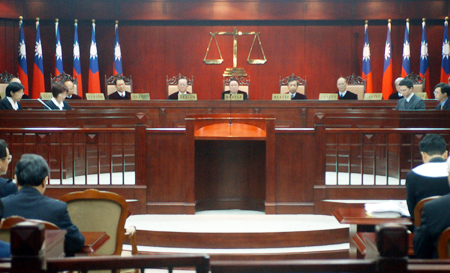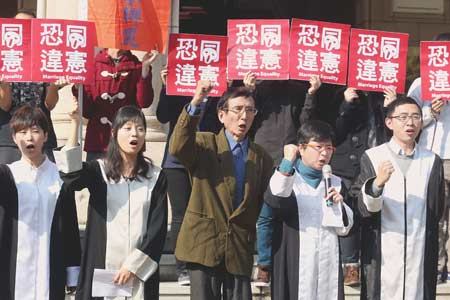by M. Bob Kao
語言:
English /// 中文
Photo Credit: 婚姻平權革命陣線
IN HER INFLUENTIAL 2004 book A New World Order, Anne-Marie Slaughter, a political scientist and legal scholar, argues that constitutional court judges worldwide are increasingly communicating with one another, resulting in judicial cross-fertilization that works toward the development of a global jurisprudence. This exchange is not merely the taking or giving of laws, she contends, but an interactive transnational dialogue within a transnational judicial community. The Taiwanese judiciary merited a mention in her book: “Indeed, the Taiwanese Constitutional Court has translated large portions of its case law into English and made them available on its website to ensure that it is part of this global dialogue” (75).
The Judicial Yuan website contains the English versions of 723 of the 728 Interpretations (the five since last August have not been translated) by the Justices of the Constitutional Court (“the Constitutional Court”) since 1949. Regardless of whether the Judicial Yuan translated the opinions as a conscious effort to participate in this global jurisprudential dialogue as described by Professor Slaughter or just as a convenience to non-Chinese readers without the idealistic motivation, it deserves praise for having the initiative to do so.
While the English translations are of relatively high quality, only the majority opinions have been translated. Separate opinions – dissents and concurrences—are available only in Chinese. Though the majority opinion is the final say on the law, often dissents, and less frequently concurrences, provide further insights that cannot be ignored. No doubt the Constitutional Court itself understands the importance of dissenting opinions by the fact that it issues them at all, as this is historically a practice of the common law tradition, which Taiwan does not follow.
According to US Supreme Court Justice Ruth Bader Ginsburg, dissenting opinions can serve two primary purposes in American courts, both of which can also apply to Taiwanese constitutional jurisprudence. First, a dissenting opinion can serve as an admonishment that a fundamentally wrong decision needs to be rectified by a future opinion. She quotes Chief Justice Charles Evans Hughes: “A dissent in a Court of last resort is an appeal…to the intelligence of a future day, when a later decision may possibly correct the error into which the dissenting judge believes the court to have been betrayed.”
Second, a dissent can “attract immediate public attention and, thereby…propel legislative change,” which is exactly what Justice Ginsburg did in the 2007 case Ledbetter v. Goodyear Tire & Rubber Co. The majority found that Lilly Ledbetter’s gender pay discrimination claim was filed too late because she did not sue within 180 days each time her male co-workers were given a higher pay raise than her. In an unusual move, Justice Ginsburg read her passionate dissent from the bench, which prompted Congress to pass a law in early 2009 that reset the limitation period in which a claim can be initiated so that all past incidents of gender pay discrimination could be combined with the current litigation. This was too late for Ms. Ledbetter, but Justice Ginsburg’s dissent led to a swift amendment of the anti-discrimination law.
 The Constitutional Court of the Judicial Yuan in session. Photo credit: CNA
The Constitutional Court of the Judicial Yuan in session. Photo credit: CNA
Given the importance of dissenting opinions, the Judicial Yuan must also provide English versions to fully participate in this global dialogue. This would ensure that the international community is provided a better sense and a more complete picture of the state and possible trajectory of the Constitutional Court’s jurisprudence.
As the purpose of the transnational network of judges is to spur the exchange of ideas, it is incumbent on the Constitutional Court not only to provide information, but also to fully and openly contemplate opinions by other constitutional courts and engage in active discourse. Thus, the Constitutional Court cannot passively adopt the reasoning or holding of a foreign constitutional court without citation, as it sometimes does now. Instead, it must explicitly engage in conversations and tackle transnational jurisprudence in its opinions. This proactive dialogue would also give the Constitutional Court an opportunity to criticize the legal reasoning of other courts when it has sound legal bases to do so, allowing it to be an active participant in the transnational judicial community.
Today, there are two pressing issues in Taiwan on which the Constitutional Court could fully engage in transnational conversations: the criminalization of adultery and the prohibition of same-sex marriage. The Constitutional Court will surely have to confront them soon, and it should take the opportunity to deliberate on the global jurisprudence that has developed in recent years that has decriminalized adultery in the vast majority of the world and legalized same-sex marriage in an increasing number of jurisdictions.
If the Constitutional Court were to still rule as constitutional the criminal adultery law or the civil code section defining marriage as between a man and a woman in Taiwan, it must thoroughly and unequivocally explain why its holding differs from, for example, the South Korean Constitutional Court opinion that struck down the criminal adultery law last month and the numerous American appellate decisions that have legalized same-sex marriage in the last couple of years. In a world described by Professor Slaughter, the Constitutional Court can no longer adjudicate in a bubble or pander to the purported morality or public opinion of the Taiwanese populace in the face of overwhelming and robust legal reasoning stating otherwise. It would have to base its decisions on sound legal analyses that can withstand the national and supranational jurisprudence of other constitutional courts.
In this hypothetical but very probable future where the state continues to police marriage and sex, the dissenting opinions (it would be shocking if there weren’t any) could lay the intellectual groundwork for future opinions overturning the current decisions or spur the Legislative Yuan to change the laws itself (though the latter would only happen in a fantasy world given its composition). The dissents must also be translated into English so the international community can understand that human rights—the right to privacy and the right to equality—are still valued by some in Taiwan today who are in positions to effect change.
 A group of lawyers protesting in support of gay marriage outside the Judicial Yuan in late December of last year. Photo credit: CNA
A group of lawyers protesting in support of gay marriage outside the Judicial Yuan in late December of last year. Photo credit: CNA
And if the Judicial Yuan were to continue to not translate the dissenting opinions, then legal scholars and activists must translate and disseminate them. This third-party model is not unheard of, as Stanford Law School’s China Guiding Cases Project translates and analyses the Chinese-language guiding cases promulgated by the Supreme People’s Court of the People’s Republic of China.
While criminal adultery and same-sex marriage are highlighted here as important issues on which the Constitutional Court can engage in transnational discourse, Taiwan’s active participation in global jurisprudence should not be confined to these two cases. The Constitutional Court should always seek dialogue through its decisions, and given the lack of opportunities for face-to-face judicial interaction due to Taiwan’s international status, it is only through this process that the credibility and international profile of the Taiwanese judiciary could be raised.



